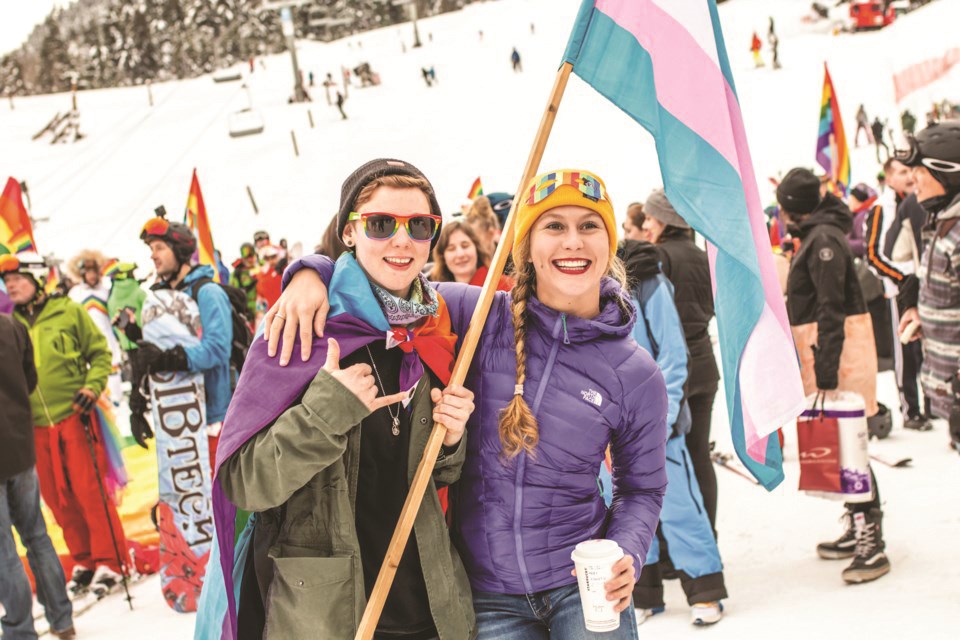Whistler has changed drastically since Sean Kearns was at the helm of Winter Pride (now the Whistler Pride and Ski Festival) in the late ’90s.
Back then, nearly every business in the village would don a rainbow flag for the festival to express it was a safe and welcoming place for the LGBT2QI+ community.
“Now, I walk through the village and there are none,” he says.
The hope, of course, is that could be a positive sign: that the equality he and his peers fought for has, to a large degree, been achieved. (Though he wouldn’t mind if those flags returned.)
“I choose to believe it’s because they feel we don’t need to do that anymore,” he says.
Kearns, who is from Washington State but has had a house in Whistler for 20 years, skipped the Whistler Pride festival for several years after selling it in an effort to keep the focus on the new owner’s event.
But this year—which marks the festival’s 30th anniversary from Jan. 22 to 29—he decided to return as a participant.
“This morning reminded me how much we enjoy it,” he said earlier this week. “It’s not about the party at the end; it’s about skiing and camaraderie.”
The parties, a fun draw for many attendees, might pay for the festival, but it’s the skiing and snowboarding events that are at its core, Kearns adds. “The heart of this event still has to be the ski guiding program,” he says. “That’s a unique thing to Whistler. I’m proud they kept that tradition going.”
Since the festival first started three decades ago, Pride festivals and events have started at nearly every major ski hill around North America. But Whistler remains one of the biggest.
Although, as the festival has grown, so too have the crowds in the resort.
“Whistler doesn’t need the festival anymore—it’s full,” Kearns says. “The resort is packed. It’s hard to run a festival when you’re not needed; you’re not providing butts in beds. It was a lot quieter when we first ran it. We were the shoulder season of winter. It was after Christmas, with no major holidays.”
Tom Fedechko, communications and creative lead for the festival, agrees it can be a challenge to plan a festival in an already bustling resort.
“Ask anyone trying to find a hotel last minute,” he says with a laugh. “Last-minute ticket sales are not a luxury that we can rely on. There have been conversations of running shuttle buses for people from Vancouver that would go home at 4 a.m. There’s nowhere for them to sleep. We haven’t had to do that yet this year.”
Although, judging by record-breaking ticket sales, those attending have figured something out, he adds.
Whistler, and wider society, have of course undergone significant changes over the past 30 years, some for the better of the festival. One example this year is an inclusivity training session the festival facilitated, run by QMUNITY, sa国际传媒’s queer, trans, and two-spirited resource centre, which is also the benefactor of the festival’s charity ski race.
It took place before festivities kicked off this week and was run alongside the Chamber of Commerce and Tourism Whistler. “It’s something that maybe wouldn’t have happened 10 years ago,” Fedechko says. “To have businesses in Whistler ask questions and learn how they can be more inclusive and prepare for our guests—how to deal with washrooms and pronouns.”
But beyond the meaning of Pride week, current event organizers are more than happy to return to normal operations after two years impacted by COVID.
“I’ll be honest with you, not having it in 2021 and even being the last big thing to happen here before everything shut down in 2020, and being back last year, has made it feel even more special,” Fedechko says. “The people on my team, none of us are driven by ego. We don’t want accolades and attention. It’s a group of people who believe in this special week that brings people from all over the world together because of a love of sport and being in a place where they can love that sport and truly be themselves—which maybe they didn’t get their whole lives.”
For information on all of the ski and snowboard events, apres, and parties, visit .



